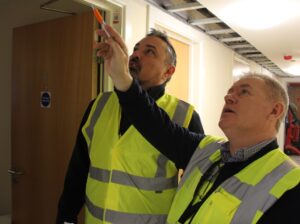Hotels are bustling hubs of activity, hosting countless guests, events, and activities daily. Amidst providing comfort and hospitality, ensuring safety within these establishments is paramount. Fire safety stands as a cornerstone of hotel management, and within this realm, fire doors play a crucial role. These specialized doors serve as a critical barrier against the spread of fire, safeguarding lives and property. However, their efficacy hinges on proper maintenance and inspection. Understanding the significance of fire door inspection courses for hotels is pivotal in upholding the highest standards of safety.
The Significance of Fire Doors in Hotel Safety
-
- Detailing the importance of fire doors in containing fire incidents within specific areas.
- Highlighting how fire doors protect occupants and facilitate safe evacuation during emergencies.
- Discussing legal requirements and building codes mandating fire door installation in hotels.
Purpose and Functionality of Fire Door Inspection Courses
-
-
- Explaining the role of fire door inspection courses in educating hotel staff about fire door components, maintenance, and inspection protocols.
- Outlining the skills and knowledge imparted in these courses, including identifying defects, conducting inspections, and understanding regulatory compliance.
- Emphasizing the hands-on training aspect to equip participants with practical expertise.
-
Ensuring Compliance with Regulations and Standards
-
-
-
- Detailing the regulatory framework surrounding fire safety standards in hotels.
- Discussing how fire door inspection courses aid hotels in complying with local, national, and international fire safety regulations.
- Highlighting the consequences of non-compliance and the potential risks associated with neglecting fire door maintenance and inspections.
-
-
Mitigating Risks and Enhancing Safety Measures
-
-
-
-
- Illustrating real-life scenarios where properly maintained fire doors have prevented the spread of fires and minimized damage in hotels.
- Emphasizing the role of regular inspections in identifying issues, defects, and wear and tear that compromise the functionality of fire doors.
- Discussing how proactive maintenance and inspections contribute to risk reduction and a safer environment for guests and staff.
-
-
-
Training and Empowering Hotel Staff
-
-
-
-
-
- Exploring the benefits of empowering hotel staff through fire door inspection courses.
- Discussing how trained personnel can contribute to ongoing maintenance, promptly identifying issues, and ensuring compliance even between formal inspections.
- Addressing the broader impact of a well-trained team on overall hotel safety culture.
-
-
-
-
Cost-Effectiveness and Long-Term Benefits
-
-
-
-
-
-
- Analyzing the cost-benefit ratio of investing in fire door inspection courses vis-à-vis potential losses due to fire incidents and legal liabilities.
- Emphasizing the long-term benefits of preventive maintenance and regular inspections in reducing repair costs and extending the lifespan of fire doors.
-
-
-
-
-
Conclusion
In the dynamic environment of hotels, where the safety of guests and staff is non-negotiable, a fire door inspection course stands as a cornerstone of effective risk mitigation. The significance of these courses in imparting knowledge, ensuring compliance with regulations, and fostering a proactive approach to fire safety cannot be overstated. Hotels investing in such courses not only prioritize safety but also uphold their reputation as responsible establishments committed to the well-being of their occupants. Ultimately, the adoption of fire door inspection courses in hotels signifies a proactive stance in safeguarding lives and property against the unpredictable threat of fire, fostering a secure environment for all.


